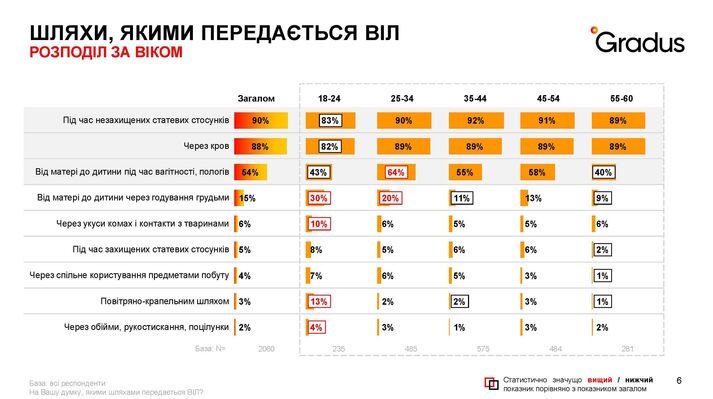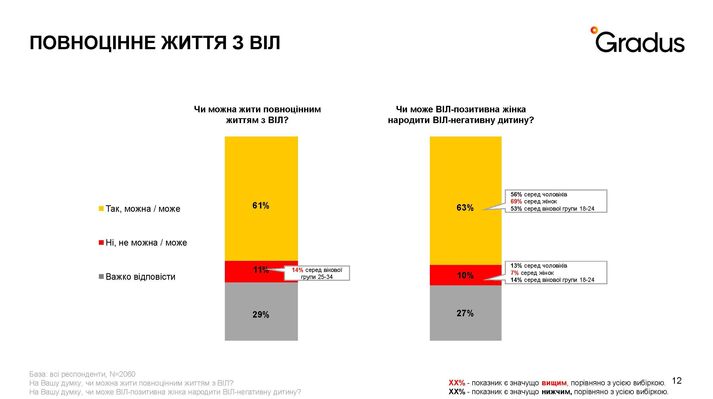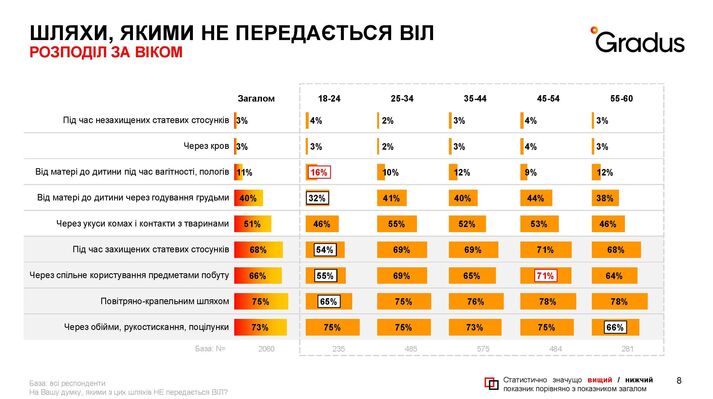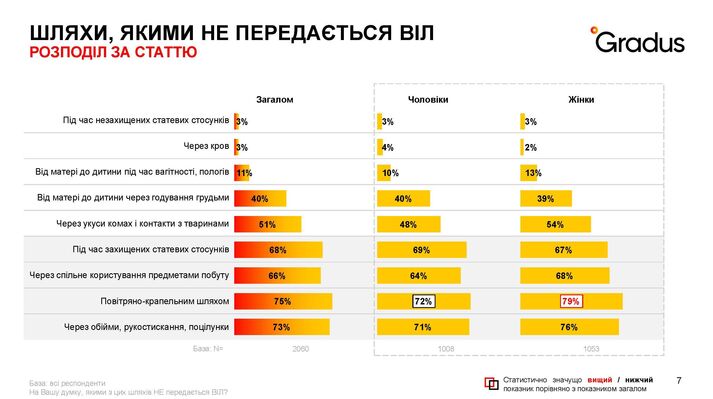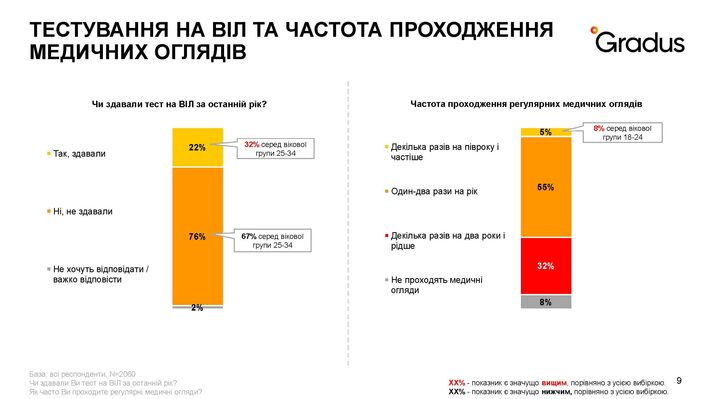The Olena Pinchuk Foundation investigated what Ukrainians know about HIV/AIDS
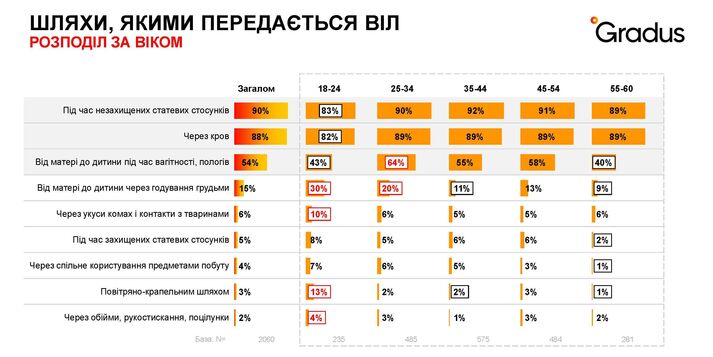

On the eve of World AIDS Day, the Olena Pinchuk Foundation presented a study showing that Ukrainians know about HIV/AIDS. Since Ukraine still ranks first in Europe in terms of the rate of spread of HIV, it is important to find out how the situation with Ukrainians' awareness of the ways of HIV transmission and methods of preventing infection has changed.
A 2023 study commissioned by the Olena Pinchuk Foundation conducted on the Gradus* platform showed a very high awareness of HIV among Ukrainians (97% know what HIV and AIDS are, and 92% know that infection can be prevented). At the same time, the results demonstrate a fairly high level of stigmatization of potential risk groups. Such groups include people engaged in prostitution (85%), drug users (85%), sexual minorities (54%), medical workers (43%), homeless people (32%). Also, 7% of the population aged 18-60 includes military personnel as high-risk groups. Among the main reasons are injuries (33%), blood transfusions (23%), contact with blood (18%), field medical aid (16%), contact with wounded HIV-infected people (14%), unprotected sexual contact ( 10%).
On the eve of World AIDS Day, the Olena Pinchuk Foundation presented a study showing that Ukrainians know about HIV/AIDS. Since Ukraine still ranks first in Europe in terms of the rate of spread of HIV, it is important to find out how the situation with Ukrainians' awareness of the ways of HIV transmission and methods of preventing infection has changed.
A 2023 study commissioned by the Olena Pinchuk Foundation conducted on the Gradus* platform showed a very high awareness of HIV among Ukrainians (97% know what HIV and AIDS are, and 92% know that infection can be prevented). At the same time, the results demonstrate a fairly high level of stigmatization of potential risk groups. Such groups include people engaged in prostitution (85%), drug users (85%), sexual minorities (54%), medical workers (43%), homeless people (32%). Also, 7% of the population aged 18-60 includes military personnel as high-risk groups. Among the main reasons are injury (33%), blood transfusion (23%), contact with blood (18%), field medical aid (16%), contact with wounded HIV-infected (14%), unprotected sexual contact ( 10%).
Even knowing about the ways of HIV transmission (blood, unprotected sexual intercourse), people do not always use condoms, which prevent not only unwanted pregnancy, but also infection with HIV and other sexually transmitted infections. Almost a third of respondents (30%) never use condoms. However, among those who do not have a permanent sexual partner, this figure is 16%. 37% of the population always or most of the time use condoms. Among those who do not have a permanent sexual partner, this figure is 46%.
"During twenty years of the Foundation's unceasing work, we paid special attention to stopping the HIV/AIDS epidemic in Ukraine. During this time, a lot has already been done, but an important task before us is to implement regular testing of people for HIV and the use of condoms as a norm. Unfortunately, ignorance and indifference to one's own health in the conditions of war gives us new challenges. Many people still put off self-care. We have to help ensure that taking care of one's health becomes a priority for every Ukrainian man and woman," said the founder of the Foundation, Olena Pinchuk.
According to the Public Health Center of the Ministry of Health of Ukraine, sexual transmission of the virus in heterosexual couples (man and woman) accounts for 68.3% of all new HIV cases. The majority of the population often does not perceive themselves to be at risk of HIV infection and may never have received HIV testing services.
Another problem was identified during the study: the low level of HIV testing. Only 22% of respondents declared that they had taken an HIV test in the last year. This level is slightly higher among people aged 25-34: one in three (32%) of them took the test in the last year.
"The high level of stress, life in constant danger and tension, as well as fatigue from war lead to the fact that people care less about their own health or neglect the basic principles of its preservation. We see these signals in other studies we've been doing since the start of the full-scale invasion. However, the results we have obtained so far are very encouraging. After all, awareness of HIV/AIDS among the adult population of Ukraine is 97%. And this is extremely important, especially in a country where there is a war, and the risks of the spread of the disease are increasing," says Yevgenia Blizniuk, sociologist, founder and director of the research company Gradus Research.
The results of the study indicate that it is important not only for general awareness of people about the HIV/AIDS epidemic, but also for identification with a potential risk group. Awareness of the risks will contribute to the formation of safe behavior and the inclusion of HIV testing in routine medical examinations. Comprehensive implementation of sex education will contribute to cultural changes in society, spreading the ethics of condom use and reducing discrimination of risk groups.
You can read more about the study below.
Reference: The Olena Pinchuk Foundation has been fighting the HIV/AIDS epidemic in Ukraine for 20 years. Since 2003, the Foundation has been conducting large-scale information campaigns, helping those affected by the epidemic, and bringing innovative international testing and treatment experience to Ukraine.
Before the Russian invasion, there were approximately 260,000 people living with HIV (PLHIV) in Ukraine, and HIV prevalence was approximately 1% among the adult population (including temporarily occupied territories). Approximately 180,000 (69%) PLHIV are aware of their HIV status.
*Gradus is an advanced platform for effective marketing and social research that delivers results in as little as 24 hours while maintaining the highest data quality.
Photogallery





